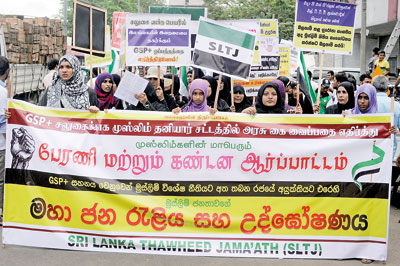News
Mixed reception to reform of Muslim marriage laws

A protest organised by SLTJ at Maligawatte. Pic by Amila Gamage
The recent announcement by the Government to appoint a Cabinet sub-committee to study the shortcomings of the Muslim Marriage and Divorce Act (MMDA) and recommend constitutional reforms, met with opposition from a section of the Muslim community.
Hundreds of members attached to the Sri Lanka Thawheed Jama’ath (SLTJ) took to the streets on Thursday against the announcement and alleged that the Government was trying to portray the issue as one of the requirements to get back the European Union (EU) Generalised Scheme of Preferences (GSP) Plus facility.
The Muslim Private Act Reform Committee, possibly the longest serving committee with more than seven years being active since its inception, is to meet today to finalise its longstanding report and hand it over to the Government.
Earlier the Justice Ministry had appointed this committee of 18 eminent representatives of the Muslim community under the leadership of former Supreme Court Judge, Saleem Marsoof to make recommendations to reform the Muslim Marriage and Divorce Act.
This report has still been overdue due to many reasons. Two of the committee members passed away in the meantime.
“ We are hopeful to reach a unanimous decision by the committee since there has been so much of dust raised over this issue for a long time,” Chairman of the Committee retired Supreme Court Judge, Saleem Marsoof told the Sunday Times.
One of the provisions in the Muslim Marriage and Divorce Act (MMDA) which is currently under discussion is the age of a girl if she is to be married off when less than 12 years old. The provision states that the consent of Quazi, a Muslim law judge should be provided for such a marriage.
Women Non Governmental Organisations (NGOs) and women activists have called for an amendment replacing 16 as the minimum age for marriage for a girl, complying with other international conventions.
The committee which is comprised of individuals who are holding conservative opinions and with more liberal views on some sensitive issues, divided significantly. The committee also called for public representations to hear their opinions too.
SLTJ Abdul Razik told the Sunday Times that whatever reforms be considered by the Government they should come from within the community complying with Sharia law and Islamic theological studies.
“Since the MMDA is relatively old, there are some provisions that have to be reformed. One such provision is dowry given during marriage and the eligibility of a girl’s age when she is to be married off. These things should be studied and changed,” he said.
The Cabinet last week approved the setting up of a committee to consider reforms to the Muslim Marriage and Divorce Act as some provisions in Muslim Law including the minimum age for marriage are not in conformity with the norms stipulated in some international conventions.
A proposal was made by Justice Minister Dr. Wijeyadasa Rajapaksa to appoint a sub-committee to study the Act which was introduced in 1951 and recommend necessary reforms or amendments.
The sub-committee consists of all Muslim members in the unity government representing various parties and parliamentarians, Local Government and Provincial Councils Minister Faizer Mustapha, Water Supply and Drainage Minister Rauff Hakeem, Public Enterprise Developmment Minister Kabir Hashim and Muslim Religious Affairs Minister Abdul Haleem.
Welcoming the Cabinet decision, the Muslim Council of Sri Lanka (MCSL) noted that there is certainly a need to amend the MMDA, but this has to be done in consultation with the Muslim religious leadership and the Muslim community in Sri Lanka and not at the dictates of the European Union or the international community. “The demand by the international community to intervene in a religious issue could cause irreparable damage to co-existence in Sri Lanka,” it said.
We urge the Government to address the concerns of the Muslims through a consultation process with Muslim political, religious and civil society leadership,” MCSL President N. M. Ameen told the Sunday Times.
Addressing a news briefing, European Union (EU) Ambassador to Sri Lanka Tung-Lai Margue with the visiting four-member delegation of the European Parliament (EP) last week noted that the ongoing discussion on marriage law in the country is purely domestic and EU has no role to play in.
“There are a number of international conventions that Sri Lanka has agreed to comply with, one among them is the International Convention of Protection of Children which clearly indicates not to allow marriages below age 16. Apart from that we are not going to be part of the discussion of how Sri Lanka is going to do that or the current debate,” Ambassador Lai Margue pointed out.

